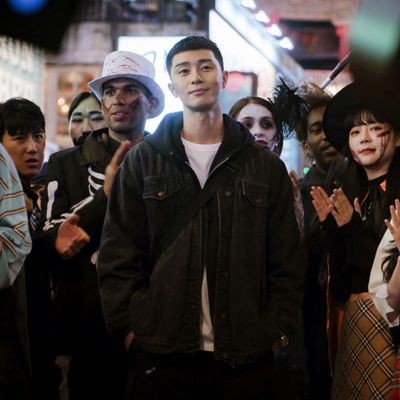
A magical alchemy occurs when the right elements come together in a Korean drama — a balance between the beautiful and the unbelievable. Itaewon Class, a 16-episode series that has just completed its run on Netflix (meaning, it is now bingeable in full), strikes that note while staying true to the form: There’s a decades-long blood feud, class warfare, overlapping love triangles, and extra long pauses that allow you to search each actor’s face and exclaim, Drop the skincare routine, king! The first television show produced by the film production company Showbox (known for blockbusters like Taegukgi), Itaewon Class feels like a remixed classic with amped-up production values and, quite frankly, better writing. And as the kids say, a bop is a bop.
The central narrative is a revenge plot revolving around Park Saeroyi, a proud, almost irritatingly dignified young man with a spine of steel and the haircut of a chestnut. His singular goal is to open a pocha (think a sit-down bar with food) called DanBam (a punny name meaning Sweet Night, or Sweet Chestnut) and turn it into the biggest food company in Korea while destroying his enemies. He opens the restaurant in Itaewon, a neighborhood in Seoul known as the foreigner’s district that has rapidly gentrified in the past decade. The various interweaving B-plots involve his ragtag crew that draws from that backdrop — a group of characters still usually not seen on Korean television — including a fellow ex-convict who spent time in prison with Saeroyi, a trans woman chef, and a black Korean looking for his father.
Saeroyi, played by Park Seo-joon (whom you may recognize as the handsome family friend who gives the Kims the lucky rock in Parasite or in his younger days as the gorgeous poet-warrior in Hwarang), is the kind of princely protagonist you root for. He’s a paragon of moral virtue in XXL fits, with an almost astonishingly naïve capacity to do the right thing even at great personal cost. In this world, he represents Good Daddy Capitalism: a boss who doesn’t discriminate, treats his workers fairly, and values relationships over money.
If Saeroyi is the hero, the villains are a father-son duo in the CEO Jang Dae-hee (Yoo Jae-myung) who runs the largest restaurateur group called Jangga and wields his power with terrifying Hobbesian energy, and his chaotically evil heir to the throne, Jang Geun-won (Ahn Bo-hyun), who has an elastic smirk that begs to be punched. Jang Dae-hee is the Goliath to Saeroyi’s David, the Bowser to his Mario. He’s Bad Daddy Capitalism, who believes that because he is rich, he is powerful, and because he is powerful, he is right. He’s driven by a petty desire to see Saeroyi on his knees (quite literally), and will stop at nothing to crush him and his friends.
The Manichean moral clarity of Itaewon Class means the ending is something of a foregone conclusion, but the journey is still thick with addictive plot twists: There’s betrayal, murder, a cooking competition, and yes, pining between Saeroyi and his childhood crush Oh Soo-ah (Kwon Nara), who works as a top-level executive at Jangga, and a hypercompetent young upstart named Cho Yi-seo (Kim Dami) with vaguely sociopathic tendencies, who works at DanBam. The show delivers that great salve of middlebrow television: It surprises and delights, while still offering a comforting sense that the good can still be good, and the bad will ultimately get their just desserts.

